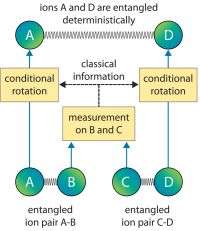Deterministic entanglement swapping: First successful implementation of a technique for quantum computers

(PhysOrg.com) -- Scientists led by Rainer Blatt, Markus Hennrich and Mark Riebe of the Institute for Experimental Physics at Innsbruck University recently succeeded for the first time in realizing a deterministic transfer of entanglement in their lab. They reported this important technique for future quantum computing in the online edition of the acclaimed science journal Nature Physics.
“Transfer of entanglement, also known as entanglement swapping is an important technique for quantum information processing and has been demonstrated in labs before. What we managed to achieve here for the first time was a targeted transfer that is called deterministic entanglement swapping,” explained Mark Riebe and Markus Hennrich of the Institute for Experimental Physics at Innsbruck University.
Entanglement is a specific connection between two individual quantum objects. For their experiment the Innsbruck scientists lined up four ions in an electro-magnetic trap and prepared them with laser beams. In a first step the ions were entangled into two pairs. Then the researchers carried out a “Bell measurement” on one ion of each pair which resulted in an entanglement of the previously unentangled ions. Depending on the result of the measurement the ions were manipulated in such a way as to produce a specific entangled state. “The quantum-mechanical entanglement can be transferred in this way by entangling two particles without a joint history,” stated Riebe and Hennrich.
Linking the building blocks of a quantum computer efficiently
This technique would be applied in future quantum computers. Entanglement is the key feature which allows quantum computers to calculate more efficiently than existing computers. The transfer of entanglement also enables the high-quality entanglement of two particles over distances. Rainer Blatt, who leads the group of researchers, explained, “The entangled particles may be separated from each other and are still linked via what Einstein called 'spukhafte Fernwirkung' (spooky action at a distance). With other methods it is very difficult to separate entangled particles without losing the entanglement.”
Entanglement swapping is of particular significance for the next generation of quantum computers. The individual building blocks of a quantum computer would then be put on small microchips and the particles would be shuttled between processing, storage and transfer elements. Rainer Blatt emphasized, “This only works if the individual ions as carriers of the qubits can be deterministically entangled and separated. We have now succeeded for the first time in proving this experimentally. It will be possible to link the different areas of a quantum computer efficiently”.
Financial support for this research project came from the Austrian Science Fund FWF within its special research area Coherent Quantum Systems, from the European Union and the Institut für Quanteninformation GmbH.
Publication: Deterministic entanglement swapping with an ion-trap quantum computer, M. Riebe,T. Monz, K. Kim, A. S. Villar, P. Schindler, M. Chwalla, M. Hennrich, and R. Blatt, Nature Physics, Advance Online Publication 26/10/2008 www.nature.com/nphys/
Provided by University of Innsbruck




















